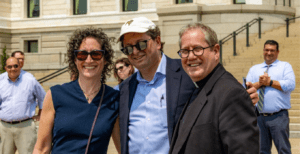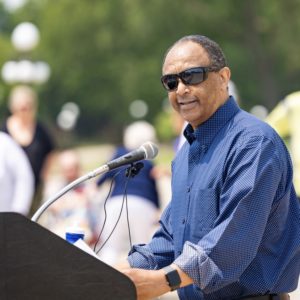With antisemitism on the rise around the country, more than 250 braved a scorching Sunday afternoon at the Minnesota State Capital to stand in defiance at the United Against Antisemitism rally in St. Paul, mirroring one of the same name in Washington, D.C., on Sunday as well.
“It was great to see so many people from the community present,” said Steve Hunegs, the executive director of the Jewish Community Relations Council of Minnesota and the Dakotas (JCRC). “There were many different organizations, places and streams of Judaism. I was heartened to see such a strong response. The remarks were terrific and on-point with different perspectives offered, which is helpful. It’s good for people to see that while we’re united, there’s also nuance and different perspectives.
The 16 speakers ranged from community organization directors, layleaders, a teenager. and clergy representing the Reform movement, Chabad, and Catholicism — Father Erich Rutten of St. Peter Claver Catholic Church in St. Paul.
“It’s a very sad reality that we live in a situation of a toxic spirit in our country,” Rutten said. “We’re here today to stand for civility. We’re here to stand for respect. We are, as people of faith, called to remember that we are all brothers and sisters, and treat each other with the dignity and respect that calls forward.”

Minnesota Rabbinical Association co-chair Rabbi Debra Rappaport, JCRC Executive Director Steve Hunegs and Father Erich Rutten. (Photo Courtesy Ethan Roberts Photography/JCRC)
Sen. Ron Latz and Jewish Community Action executive director Carin Mrotz both referenced the coalition that has been pushing to strengthen the hate crimes laws in Minnesota, which failed to receive a hearing in the Republican-led State Senate. Mrotz, however, is optimistic that it can succeed.
“Part of why we’re so optimistic that we will win is the solidarity and relationships that have formed between our groups and our communities. If fear can push us to isolation, solidarity can bust through that fear and make us whole,” she said, adding that the communal spirit is necessary. “But we need to talk to each other. I can’t let my fear push me to build a bunker whose walls are so thick that I can’t hear my neighbor ask for help. And what can my own safety mean if it comes at the expense of my neighbor’s, and my neighbor is still afraid?”
Many of the speakers referenced the rise in reported antisemitism incidents. According to the Anti-Defamation League’s website, there were 144 incidents in Minnesota in 2020-21 so far, and 188 including North and South Dakota, which is part of the JCRC’s territory.

Aklilu Dunlap of the Multi-racial Jewish Association of Minnesota was one of the speakers at the event. (Photo Courtesy Ethan Roberts Photography/JCRC)
David Goldenberg, the ADL Midwest director, said the past four years have marked the highest four years in the number ofincidents the organization has tracked in more than four decades. He said that in the Midwest alone, there’s been an 84% increase in the number of incidents reported, and a 55% increase in antisemitic incidents in K-12 schools.
“What we’re finding is that younger people are experimenting with hate in ways that they have never experimented with it before,” he said. “Long gone are those days where you have to find a meeting in the darkness of the night to be exposed to antisemitism and extremism. Instead you just pick up [a phone], and within seconds you have access to antisemitism, to hate symbols, to hate speech, to hate groups, not only in your community, not only in our country, but around the world.”
The event was sponsored by a wide swath of the Jewish community, which Hunegs called the “hallmark of a healthy community.” The event was co-sponsored by the: JCRC, Minneapolis Jewish Federation, St. Paul Jewish Federation, ADL Midwest, American Jewish Committee, Chabad Lubavitch of Minnesota, Edot Midwest Regional Jewish Diversity and Racial Justice Collaborative, Hadassah Minneapolis, Hadassah Upper Midwest, Jewish Community Action, Jewish Family and Children’s Service of Minneapolis, Jewish Family Service of St. Paul, Minnesota Hillel, Minnesota Rabbinical Association, Minnesotans Against Terrorism, Multiracial Jewish Association of Minnesota, NCJW Minnesota, Sholom, Students Supporting Israel, TC Jewfolk, and Zioness Twin Cities.
“[The rally] is an opportunity to connect people to various efforts in the community,” Hunegs said. “How is it that we respond as a community, the opportunity for in a way for us to take stock by listening to each other? We discover, as we exchange ideas that many of us are more or less in the same place. I think it helps facilitate communication about what NCJW is doing, what JCA or other organizations is doing. It helps us build a structured scaffolding in the community. it’s also helpful that we have the communal organizational, wherewithal to gather on fairly short notice, to affirm solidarity for democracy to affirm a better future.”

